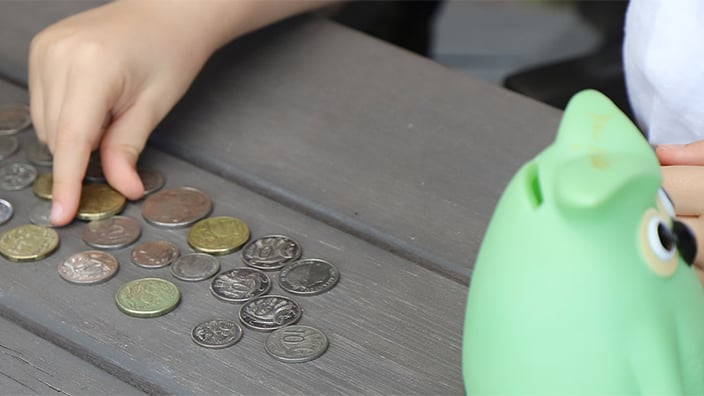 The notion of pocket money over time hasn’t changed: a financial reward for completing tasks outside of the normal expectations of contributing to a household. For many, contributing to the household means emptying and stacking the dishwasher, helping with groceries, vacuuming, mowing lawns, walking the family dog … and the list goes on.
The notion of pocket money over time hasn’t changed: a financial reward for completing tasks outside of the normal expectations of contributing to a household. For many, contributing to the household means emptying and stacking the dishwasher, helping with groceries, vacuuming, mowing lawns, walking the family dog … and the list goes on.
But dispensing money from the bank of mum and dad breeds expectation, like a hand out, spoon in mouth ‘Please Sir, can I have some more.’ The payment needs to be linked with effort for it to be educational – and you’re never too young to get started with work.
Pocket money is a child’s first taste of employment, the terms of which are often negotiated in spirit – with some households reporting employee negotiations akin to today’s toughest industrial relations courts.
While critics will cry child labour or even blatant bribery, we don’t want kids to think they can buy anything with the tap of a card or flash of a phone and not fully appreciate where that money comes from, or the consequences of a binge spend session at the local shops.
The subject of pocket money can be a tricky one and there are various methods out there for parents to help their kids learn the value and money manage. It can be as simple as encouraging them to put aside some of their pocket money into a piggy bank every week, helping kids understand the concept of saving and seeing their funds build, and then being socially responsible for spending it wisely.
This simple saving technique is great practice for the real world, especially as we see the rise of “tap and go” at the checkout, which has made it even tougher for kids to understand this seemingly endless money cloud.
Pocket money is a very good way to instil important life lessons. It makes children understand the value of a dollar, how to earn it, spend it and offers a more long-term view of the notion of reward.

Pocket money: top tips
1. Incentivise for good behaviour
Kids love a good pat on the back. Even better when it comes in the form of gold stars that actually turn into gold. Lots of households encourage good – or bad – behaviour. One idea is to allocate $5 a week to each child and deduct some of the pocket money for every misdemeanour – 50c for a small crime, $1 for a major one. So, at the end of the week the sins would be tallied and deducted from their pocket money. Admittedly, some weeks they were in the red! Occasionally a ‘Bonus Week’ could be introduced, where if the children do all their jobs without being asked they also unlock a cool experience- they tend to choose things like hire a tennis court, have Mum or Dad sleepover in their room, trip to the movies or Timezone.
2. How much is too much?
Getting the right balance between the ever-tightening household budgets with our kids’ growing expectations is a tense time for many parents. Juggling growing family expenses and our ‘Screenagers’ (Gen Z’s and Alpha’s) increasing desires is definitely a first-world problem many of us didn’t face in our formative years. Parents these days need to consider some sage advice when it comes to pocket money: don’t overthink it and whatever you do, don’t encourage your kids to compare with their peers on how much they earn - there will always be those kids out there getting fistfuls of cash as an allowance and always sporting the latest gadgets.
So how much should you really be giving out? Experts suggest anywhere from $5 a week as a baseline and advise considering adding bonus dollars for added extras. This could be to reward hard work around the house or good behaviour. For example Miss 12 receives $5 a week and her 8-year-old sister earns a gold coin for specific tasks (including being kind to her sister, go figure).
3. Encourage pooling resources
As they grow into teenagers the value of a dollar should be fairly well instilled, so now it’s time to move onto lessons in shared economy. This involves learning to share resources they can’t afford individually – like a shared bedroom, TV, or gaming consoles. It's also worth considering setting up a savings account for your child as they get older so they can begin to understand and manage digital transactions.
This will set them up for those heady years when first out of home and flatting where pooling resources is key. Not just for essentials like groceries or bills but those extra pieces of joy. In any share house full of first-year university students a shared hairdryer, toaster or even a fridge are items which are often shared. Above all keep a dialogue always open with your teen and never miss an opportunity to educate and set by example. Try to refrain from stories of ‘back in my day banking was different’.
This article is intended to provide general information of an educational nature only. It does not have regard to your objectives, financial situation or needs and must not be relied upon as financial product advice. Before you act on this information, you should consider whether it is appropriate for your circumstances. Applications subject to credit approval and fees and charges are payable. Terms and conditions apply and are available on request. Information in this article is current as at the date of publication.




